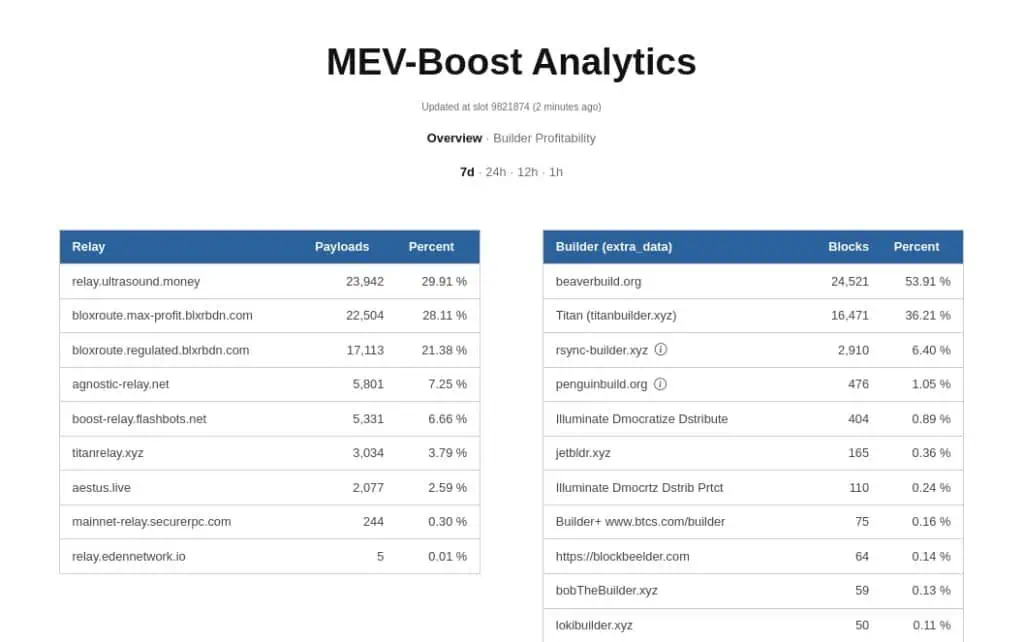
The Ethereum blockchain has evolved in recent years, raising new concerns about the control that a small number of block builders exercise over the creation and validation of transactions.
The centralization of private order flow in the hands of a few block builders has raised concerns about fairness and accessibility on the Ethereum network.
In a recent report, Blocknative, a platform dedicated to real-time observability of blockchain transactions, highlighted that the order flow of private transactions on the Ethereum network has seen dramatic growth in the last year, revealing new vectors of centralization.
The rising trend in the use of private transactions underlines the increasing centralization of the block construction market, as the order flow of private transactions is only accessible to permissioned network participants, the report.
Centralization of block construction: A growing problem in Ethereum
With the implementation of The Merge on Ethereum in 2022, one of the developers' key goals was to address the blockchain trilemma and foster a more scalable network without sacrificing security and decentralization.
However, recent statistics reveal that blocks on the chain have been being created by a limited group of block builders. In fact, data from the Relayscan platform shows that, in the last month, a single block builder, Beaverbuild, has been responsible for more than half of the blocks created on the blockchain. This is an alarming trend, since more than 85% of the blocks were generated by the two main builders, and more than 90% by just three of the main builders on the chain.

Source: Relayscan
Centralization in block construction has been driven by the phenomenon known as maximum extractable value (MEV). This phenomenon allows block builders to reorganize transactions to maximize their profits, which often includes practices such as front running, a practice that takes advantage of confidential information from pending transactions and arbitration between different platforms. As high-frequency traders (HFTs) seek to maximize their profits, they establish direct relationships with block builders, allowing them to submit transactions privately and competitively.
As Blocknative's report points out, this level of centralization raises serious concerns about network fairness and accessibility. As block builders become more dominant, regular users may be excluded from the opportunity to have their transactions included in blocks, which could lead to a decline in trust in the Ethereum network.
“The flipping of private gas use is not just a statistic: it is a call to action for the Ethereum community to ensure that the network remains open, fair and accessible to all users”, pointed out the platform.
The impact of private transactions
The rise of private transactions is one of the main centralizing forces within the block construction market, according to Blocknative. In its report it indicated that more than half of the gas fees on Ethereum are now paid by private blocks, which represent approximately 30% of all blocks generated on the chain. According to the platform, private order flow on Ethereum has become a trend among HFTs looking to protect their trading strategies, using private transactions instead of sending their trades to the public mempool.
Private transactions allow HFTs to ensure that their trades are included in blocks more efficiently, as they can pay block builders to prioritize their transactions.
This approach, while lucrative for HFTs and block builders, raises concerns about transparency and fairness in network access. When transactions are carried out in secret, it creates an environment in which only a few privileged actors have access to the most profitable opportunities.
Furthermore, this centralization could lead to greater volatility in the market, as the decisions of a small number of block builders can have a disproportionate impact on the network. The lack of diversity in block construction could result in lower resistance to attacks and market manipulation, which could compromise the integrity of the blockchain.
Possible solutions to guarantee a decentralized blockchain
As concerns about Ethereum centralization grow, various solutions are being explored to address these challenges. One of the most discussed proposals is the modification of the proposer-builder separation (PBS) model to unravel the dynamics between mining transactions at the top of the block and the flow of private orders.
Recent research, such as that conducted by the Mechanism team, suggest that by modifying the PBS system, a more equitable and decentralized environment could be created. This would involve implementing mechanisms that limit the ability of block builders to profit from private transactions, thus promoting greater competition and diversity in block construction.
“Our findings suggest that modifying PBS to untangle the intertwined dynamics between top-of-block mining and private order flow would pave the way for a fairer and more decentralized Ethereum.”, said researchers Tivas Gupta, Mallesh Pai and Max Resnick of Mechanism.
Another possible solution is the implementation of technologies that increase transparency in the construction of blocks. This could include developing platforms that allow users to monitor and audit how transactions are selected and prioritized, ensuring the process is accessible to all blockchain participants.
A well-informed community in favor of decentralization
On the other hand, encouraging education and awareness about the risks associated with centralization could help users make more informed decisions about how they interact with the Ethereum network.
As more people understand the implications of private transactions and centralization, there is likely to be greater pressure to implement changes that promote decentralization.


